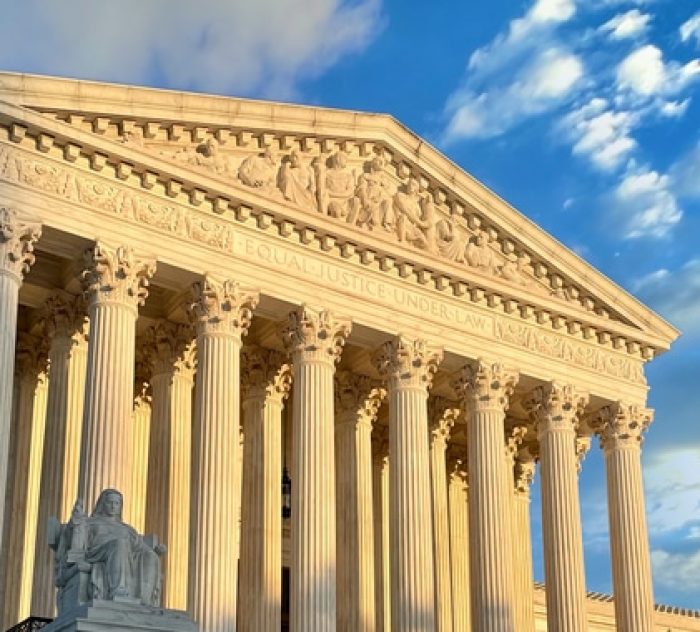On February 20, 2024, the United States Supreme Court declined to hear a case challenging a “race-neutral” admissions policy at a public magnet high school in Fairfax County, Virginia.
In 2020, the Fairfax County Board of Education (“Board”) adopted a new admissions policy for Thomas Jefferson High School (“TJHS”), an elite, magnet high school in Fairfax County Public Schools (“District”). This policy sought to diversify TJHS’ student body, which historically had included few low-income students, few English-language learners, few students eligible for free or reduced-price meals, few special education students, and few minority (Black, Hispanic, or multiracial) students.
The policy’s aim was to reflect the diversity of the District, and the initial proposed revisions removed from the existing admissions policy the application fee as well as the standardized test, essay, and teacher recommendation requirements, while increasing the minimum grade point average (“GPA”) from 3.0 to 3.5.
After months of discussion, including input from the public, the Board adopted a “holistic review” proposal, whereby each public middle school within TJHS’s feeder pattern was allocated a number of seats for the incoming first-year class, beginning with the class of 2025. Within each middle school, prospective students were evaluated and selected based on their GPA, their “portrait sheet,” and “experience factors.”
A student’s “portrait sheet” described a student’s particular skill set and the “experience factors” included whether the student was identified as in need of special education and related services, was eligible for free or reduced-price meals, was an English-language learner, and was attending a historically underrepresented public middle school.
Upon adoption of the new admissions policy, the Board resolved that “the admissions process must use only race-neutral methods that do not seek to achieve any specific racial or ethnic mix, balance or targets.” (Internal quotations omitted). In support of that resolution, an applicant’s name, race, ethnicity, or sex was not submitted to the admissions team.
In March 2021, as TJHS was selecting the class of 2025 using the new admissions policy, the Board was sued by a parents’ advocacy group, Coalition for TJ (“Coalition”) in the United States District Court for the Eastern District of Virginia. The Coalition alleged that the new admissions policy was unconstitutional, violating the Fourteenth Amendment. The Coalition’s position was that the new admissions policy had a disparate impact on Asian American applicants to TJHS. The District Court granted summary judgment in favor of the Coalition, and the Board appealed to the Fourth Circuit Court of Appeals in March 2022.
In May 2023, just one month before the Supreme Court’s decision in Students for Fair Admissions, Inc. v. University of North Carolina and Students for Fair Admissions, Inc. v. Harvard College, the Fourth Circuit Court of Appeals reversed the District Court’s decision, holding that the Board’s revised admissions policy did not violate the Equal Protection Clause. The Fourth Circuit stated that the Coalition had failed to show that the new admissions policy disproportionately impacted a certain racial group and that the disproportionate impact could be linked to invidious discriminatory intent, which is discrimination that is intended to be malicious, hostile, or damaging. The Fourth Circuit pointed to admissions data for the students admitted to TJHS, presented in the chart below.
| Thomas Jefferson High School Class of 2025 | ||
| Race | Percentage of Applicants | Percentage of Admitted Students |
| Asian American | 48.59 | 54.36 |
| Black | 10 | 7.9 |
| Hispanic | 10.95 | 11.27 |
| White | 23.86 | 22.36 |
| Multiracial/Other | 6.6 | 4.9 |
In addition to noting that Asian Americans had the “highest admissions success rate” of any group admitted to the class of 2025, the Fourth Circuit also observed that the number of low-income Asian American students admitted to the TJHS class of 2025 increased after the adoption of the new admissions policy.
Finally, the Fourth Circuit also stated that the Coalition failed to provide sufficient evidence that the purpose of the new admissions policy was to discriminate against Asian American students or achieve “racial balance” among TJHS’ student body.
Following the Fourth Circuit’s ruling, the Coalition filed a petition for a writ of certiorari with the United States Supreme Court. Earlier this month, on February 20, 2024, the Supreme Court denied the petition. However, the decision to let the Fourth Circuit ruling stand was not unanimous. Justices Samuel Alito and Clarence Thomas published a dissent, stating the that Fourth Circuit’s decision was “patently incorrect and dangerous understanding of what a plaintiff must show to prove intentional race discrimination.”
The Supreme Court’s decision to deny certiorari means the Fourth Circuit’s ruling remains the controlling law in North Carolina, South Carolina, West Virginia, Virginia, and Maryland, and raises questions about the constitutionality of “race-neutral” admissions policies and practices for educational institutions K-16. If you have any questions, the education attorneys at Poyner Spruill LLP are available to help.


